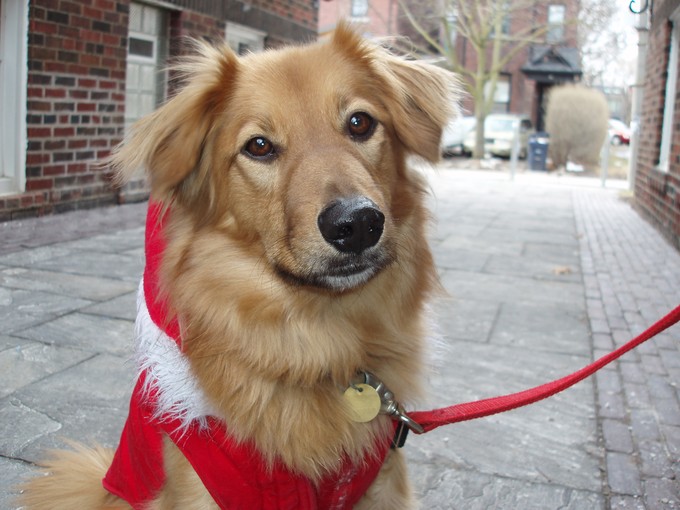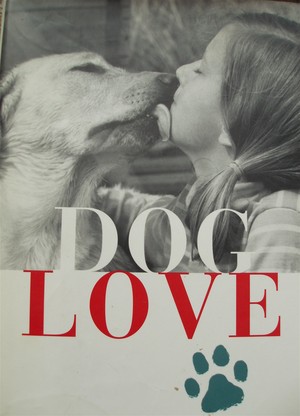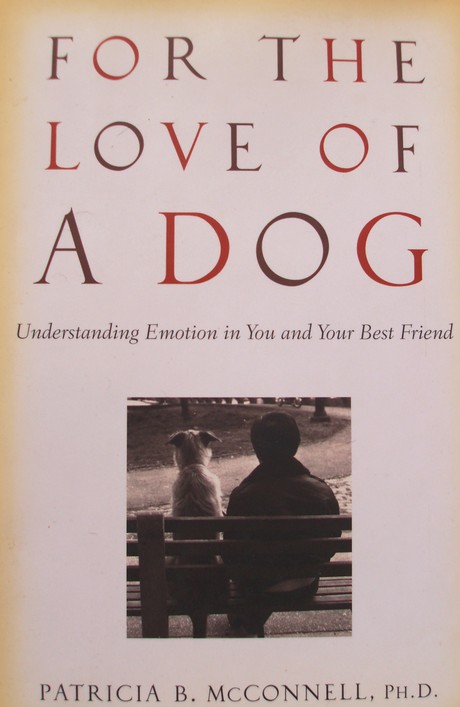Love buzz

This is not the look of love. This is the look of a dog who hates clothes, even on Valentine's Day.
Valentine's Day has come and gone, uncelebrated except for the card I sent my nephew, which read "You're the shitzu" (he's too old for Valentine's Day cards, but not for terrible puns). No need for me, a pet person, to celebrate the romance of the day. Scientists tell me I am swimming in a sea of oxytocin.
According to research, the loving looks, the joyous greetings at the door, the stroking of tenderly exposed bellies — all these human-canine rituals swamp us in oxytocin, also known as the love/ trust/ nurture hormone. And by 'us' I mean humans and dogs; there's an "oxytocin-gaze positive loop" that both species benefit from. The longer we look at each other, the bigger the buzz. But while humans' oxytocin can increase up to 300%, dogs get a smaller bounce, up to 130%.
I find this discrepancy weird, because when I come home, I am not the one with shining eyes and a madly wagging tail, eagerly pawing at the doggie barricade. I am the one who churlishly times out five minutes, waiting for calm behaviour before rapturous greetings. I thought I was happy to see the dogs largely because they were ecstatic to see me. Yet blood tests would suggest the bliss is more mine than theirs. Huh.

In Dog Love, cultural critic Marjorie Garber roves between real life and pop culture.
These days dogs' reputation as a species rests mostly on our love connection. On my bookshelf, for instance, I have 'Dogs Never Lie About Love', 'For the Love of A Dog', 'Dog Love', and (still unread) 'Marley and Me: Life and Love With the World's Worst Dog'. Dogs' lovey-dovey ways fascinate me, because before I got one, it was a big source of irritation. All that indiscriminate, jumpy-uppy, drool-laced ardour. It showed a lack of judgement vis a vis the human race, I thought.
Clearly I've had a change of heart, possibly because dog-generated oxytocin has, literally, brainwashed me. But skimming the studies, I'm left with more questions than answers. Do more stand-offish dogs provide a smaller oxytocin boost, for instance? My first dog, Mim, only ever licked me on the rare occasions I got down on the floor to do sit ups. Then she would hustle over and lap at my chin, less a gesture of affection than a medical intervention; she was trying to snap me out of a psychotic break. Still, a lick is a lick. I was as happy with her stingy displays of affection as I've been with any of my ultra-adoring dogs. Maybe with Mim I got a bigger surge of OT, less frequently. I await upcoming studies on such topics with great interest, if not a wagging tail.
More typically, dog people have to tone down their dogs' demonstrativeness. Faces get bruised by fervent head butts; lips are split by gung-ho, misplaced paws. Dogs catch on fast, though. When Notley first joined our pack, she'd pound on my pelvis. Now she rolls languorously on her side, front leg lifted suggestively to expose her tummy. She knows a pushover when she sees one. I am very well trained.

Wanna know not just about love, but a bunch of other feelings? This is the book for you.
And so are my dogs (at least in the love department). Mack Crack use to moan occasionally when I petted him; when I began to moan right back at him, and murmur praise, the moaning became a nightly routine. Recently Notley has started up too — even when I'm not petting her. Sometimes we drift off to sleep in a chorus of groans. Pushkin is the only silent holdout, but she's young. Soon she'll be singing to the choir.
Of course, humans have deliberately selected dogs for their showy, demonstrative attachment styles. A recent genetic study seems to confirm this. Scientists looked at the genes of people with Williams-Beuren Syndrome, a condition that, among other things, causes excessive friendliness, even with strangers. Then they looked at dogs, and discovered that they share some changes along the same genetic region as these hypersocial humans, providing a genetic clue to dogs' pro-social behaviours.
The scientists then go on to suggest suggest that we've selected dogs for a level of friendliness we'd find unacceptable in people. This extrapolation seems a bit curmudgeonly — isn't touchy-feely euphoria what made Ecstasy so popular in the 90s? I think more love-fests amongst humans would be a good thing, although I should probably mention I am not a hugger, so I won't be organizing them.
I should also probably mention that the oxytocin theory has its skeptics, who refer to it as "the hype hormone." They challenge both it's supposed behavioural effects and the way it's measured in many of the studies. I can't follow all the science, but I get the same feeling I get when I read about the doggy MRI studies which prove — wait for it — that dogs have feelings. It seems some scientists spend a lot of time proving the obvious, then arguing about their methods for doing so.
Not that I'm not grateful to scientists; I'm glad that my meagre tax dollars help finance their work. (It's possible to be both a supporter and a contrarian, right?) The oxytocin studies prompted me to think more about my relationship to dogs: about all the different ways dogs ask for and give attention, about how they display their love, or don't, and how we reciprocate, or don't. To ponder the mystery of who's happier to see whom, and to remind myself that, in terms of oxytocin, I am the biggest beneficiary.
Further reading on oxytocin and pets:
http://www.sciencemag.org/news/2015/04/how-dogs-stole-our-hearts
http://science.sciencemag.org/content/348/6232/333
A couple of articles from the oxytocin sceptic perspective:
http://blogs.discovermagazine.com/neuroskeptic/2017/05/03/measure-human-oxytocin/#.Wo4VQyMrJD0
https://social-science-evolving.com/2014/02/25/the-trouble-with-oxytocin-part-ii-extracting-the-truth-from-oxytocin-research/
To learn more about the genetic basis of dogs' hypersocial, tail-wagging ways:
http://www.cbc.ca/radio/quirks/dogs-are-happy-mutants-the-chocolate-microbiome-plant-sunburn-cancer-metastasis-finding-aliens-1.4215679/your-dog-s-mutant-superpower-is-love-1.4215688
Want to make a comment and avoid registering with Disqus? Click on 'join the discussion' and in the name field at the bottom of the form check "I'd rather post as a guest." A name and email address are still required.